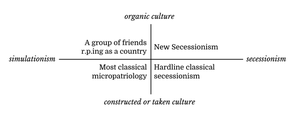Simulationism
| Part of a series on |
| Simulationism |
|---|
 |
| Concepts |
| Organisations |
| Platforms |
Simulationism is a movement within micronationalism that is opposed to secessionism; broadly speaking, micronations which can be identified as simulationist do not claim sovereignty or independence and seek to function more as a political or cultural simulation.
Simulationist micronations have historically been in the minority to the degree that the Wikipedia article "Micronation" specifically states that the formal claim to sovereignty or independence is what distinguishes a micronation from an "imaginary country." However, from the late 1990s, the rise in internet access and the ease with which online forums and message boards can be used to simulate government business has led to a rise in nation-building projects which identify as micronations despite existing wholly or partially online, and regardless of any serious intent (or lack thereof) from their leaders and members.
A formal and persistent - even if de facto jocular - claim to sovereignty over physical territory remains the definitive criterion for classification as a "true" micronation as opposed to interactive geofiction for the majority of micronationalists, as well as external academic observers. However, the past decade has seen an increasing acceptance of projects classifying themselves as micronations, even if they do not formally claim sovereignty or should happen to exist in a purely virtual or non-physical sense.
With the growing acceptance of simulationism as a valid expression of micronationalism, there has been controversy over the exact boundary between simulationist micronations and purely geofictional projects.
Three main types of projects exist which can fall under the umbrella of simulationist micronations:
- Cultural or political simulations, in which the running of the nation is seen mostly as a hobby; it does not formally claim sovereignty or independence from its macronation of origin but nevertheless engages in physical, "real world" activities, meetings, elections, etc. Examples include Jupiter and Richensland.
- Virtual nations, in which the "nation" supposedly governed by a government exists wholly or partially online or in the minds of its creators and citizens. The leaders of the nation may maintain physical embassies and attend summits with other micronational leaders, partaking in real-world activities, but the territory which they claim as their country is unable to actually be physically found or visited. Examples include Ruritania and Angyalistan.
- Geofiction or "conworlding" is a more disputed example, but members of these projects do often claim to be micronationalists. This refers to entities in which a nation is openly, explicitly, and unabashedly fictional, with no real-world activities or impact. The emphasis on projects such as these is on detailed storytelling and worldbuilding and the simulation of politics in a fictional environment. Although some examples of this hobby - the two most prominent examples being Micras and NationStates - have claimed to be included within micronationalism, this claim is usually rejected even by other examples of simulationist projects on this list.
It is important to note that "simulationism" should not properly be used to describe fraudulent micronations such as Erusia or the Kingdom of Catan, which use sockpuppets, claim exaggerated populations, and fabricate fictional events for reasons of fraud or self-aggrandizement. These fraudulent micronations are not to be confused with virtual nations. Leaders of virtual nations are, when "out of character," open about the fact that their micronations do not exist in the "real world"; fraudulent nations, on the other hand, can be defined by their refusal to admit any lies or falsehoods that they may advance.